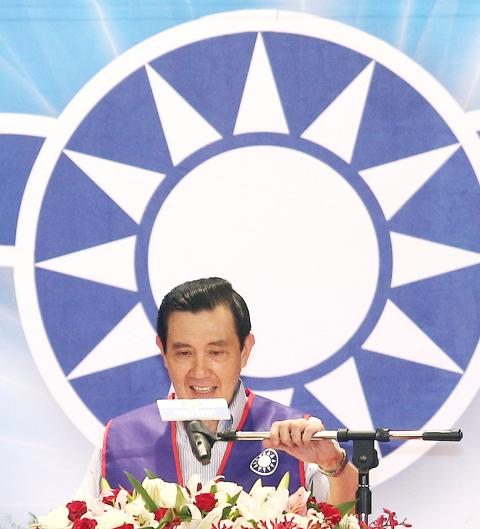The Cross-Strait Taiwanese Business People Chinese Nationalist Party (KMT) Fan Club celebrated its establishment in Taipei yesterday. President Ma Ying-jeou (馬英九), who was present at the event as KMT chairman, called on Taiwanese businesspeople working in China to support the KMT, which he said is “on the right side of history.”
Top echelons from the party and KMT candidates attended the celebration, organized by Taiwanese working in China to rally votes and encourage businesspeople to return to participate in the Nov. 29 9-in-1 elections.
KMT vice-chairpersons Wu Den-yih (吳敦義), Tseng Yung-chuan (曾永權) and Hung Hsiu-chu (洪秀柱), KMT Central Review Committee Chairmen Lin Join-sane (林中森) and Chiang Pin-kung (江丙坤) — who are respectively the current Straits Exchange Foundation chairman and the former chairman — KMT Taipei mayoral candidate Sean Lien (連勝文) and Taoyuan County Commissioner John Wu (吳志揚) were present at the event alongside business representatives from the nation’s 22 cities and counties.

Photo: CNA
The founding of a KMT fan club among Taiwanese businesspeople working in China for local elections rather than a national election has no precedent.
The reason might have been hinted at by Ma’s speech at the event, in which he said that in some regions: “We are having a close [election] fight.”
“The KMT is on the right side of history and on the side consistent with the needs of the people,” Ma said, highlighting that the party won the 2008 and 2012 presidential elections with the support of Taiwanese businesspeople and that they could again play a key role this year.
Ma reiterated his view that the suspicion that former Mainland Affairs Council deputy minister Chang Hsien-yao’s (張顯耀) leaked state secrets was only “a small ripple in the strong wave of cross-strait developments.”
Ma also championed his efforts in improving cross-strait relations, emphasizing that the student-led Sunflower movement might have hindered the progress of the cross-strait service trade agreement, but did not prevent China’s Taiwan Affairs Office director Zhang Zhijun (張志軍) from visiting Taiwan.
Berating opposition parties for having what he termed “knee-jerk protests” whenever encountering China, Association of Taiwan Investment Enterprises on the Mainland chairman Kuo Shan-hui (郭山輝) said the service pact “must be passed regardless of its flaws,” as the pact is for the overall “uplift and cannot be opposed for a few blemishes or simply for the sake of opposition.”
Kuo said the 138 associations of Taiwanese businesspeople in China would make lists of names to guide the mobilization of potential voters.
The associations are also to help potential voters obtain group discounts for airplane tickets in order to encourage their return for the election, he added.

Intelligence agents have recorded 510,000 instances of “controversial information” being spread online by the Chinese Communist Party (CCP) so far this year, the National Security Bureau (NSB) said in a report yesterday, as it warned of artificial intelligence (AI) being employed to generate destabilizing misinformation. The bureau submitted a written report to the Legislative Yuan in preparation for National Security Bureau Director-General Tsai Ming-yen’s (蔡明彥) appearance before the Foreign Affairs and National Defense Committee today. The CCP has been using cognitive warfare to divide Taiwanese society by commenting on controversial issues such as Taiwan Semiconductor Manufacturing Co’s (TSMC, 台積電) investments in the

INVESTIGATION: The case is the latest instance of a DPP figure being implicated in an espionage network accused of allegedly leaking information to Chinese intelligence Democratic Progressive Party (DPP) member Ho Jen-chieh (何仁傑) was detained and held incommunicado yesterday on suspicion of spying for China during his tenure as assistant to then-minister of foreign affairs Joseph Wu (吳釗燮). The Taipei District Prosecutors’ Office said Ho was implicated during its investigation into alleged spying activities by former Presidential Office consultant Wu Shang-yu (吳尚雨). Prosecutors said there is reason to believe Ho breached the National Security Act (國家安全法) by leaking classified Ministry of Foreign Affairs information to Chinese intelligence. Following interrogation, prosecutors petitioned the Taipei District Court to detain Ho, citing concerns over potential collusion or tampering of evidence. The

‘COMPREHENSIVE PLAN’: Lin Chia-lung said that the government was ready to talk about a variety of issues, including investment in and purchases from the US The National Stabilization Fund (NSF) yesterday announced that it would step in to staunch stock market losses for the ninth time in the nation’s history. An NSF board meeting, originally scheduled for Monday next week, was moved to yesterday after stocks plummeted in the wake of US President Donald Trump’s announcement of 32 percent tariffs on Taiwan on Wednesday last week. Board members voted to support the stock market with the NT$500 billion (US$15.15 billion) fund, with injections of funds to begin as soon as today. The NSF in 2000 injected NT$120 billion to stabilize stocks, the most ever. The lowest amount it

NEGOTIATIONS: Taiwan has good relations with Washington and the outlook for the negotiations looks promising, Minister of Economic Affairs J.W. Kuo said Taiwan’s GDP growth this year is expected to decrease by 0.43 to 1.61 percentage points due to the effects of US tariffs, National Development Council (NDC) Minister Paul Liu (劉鏡清) said at a meeting of the legislature’s Economics Committee in Taipei yesterday, citing a preliminary estimate by a private research institution. Taiwan’s economy would be significantly affected by the 32 percent “reciprocal” tariffs slapped by the US, which took effect yesterday, Liu said, adding that GDP growth could fall below 3 percent and potentially even dip below 2 percent to 1.53 percent this year. The council has commissioned another institution